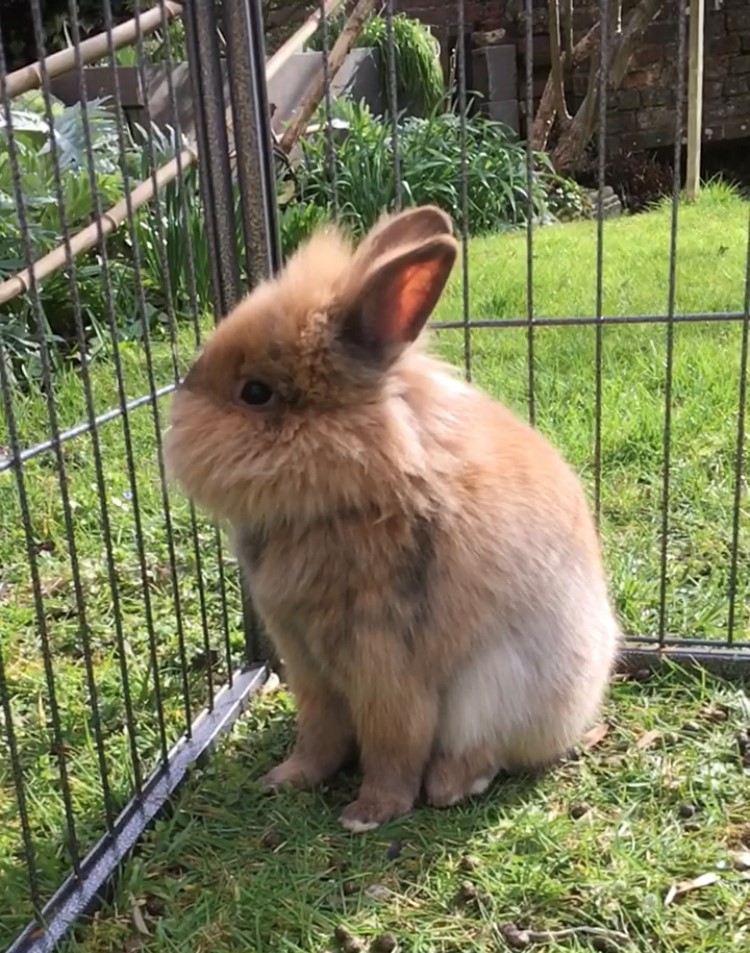Not so happy bunnies: New RVC research reveals the breeds most at risk of tear duct inflammation this International Rabbit Day
New research by the Royal Veterinary College (RVC) has revealed the rabbit breeds most at risk of developing dacryocystitis, an inflammatory condition of the tear ducts, including Lionheads, Mini Lops, Lops and Dwarf Lop rabbits. The research also uncovered the prevalence of the subsequent medical conditions associated with dacryocystitis.

Dacryocystitis is relatively common among pet rabbits due to the unique structure of their nasolacrimal duct which can easily become obstructed. The condition is therefore associated with a range of other dental, respiratory, aural and ocular problems which can be painful and uncomfortable for the animal.
In undertaking the research, the team, comprised of Dr Joanna Hedley, Senior Lecturer in Exotic Species and Small Mammal Medicine and Surgery; Victoria Ede, RVC graduate; and Dr Charlotte Dawson, Senior Lecturer in Veterinary Ophthalmology, conducted a retrospective review of medical records from all rabbit cases evaluated at a single first opinion/referral UK exotics clinic between 2015 and 2018. This included analysing data from 821 rabbits which recorded their most recent weight, sex, neuter status, breed and presence of lop ears.
After analysing the data, the researchers found that 6.7 per cent of the rabbits had dacryocystitis. Of those rabbits, dental disease was found in 45 per cent, respiratory disease in 38 per cent, concurrent ocular disorders in 23 per cent and aural disease in 13 per cent.
The study also revealed that sex/neuter and breed status were the two most significant risk factors in developing dacryocystitis, with male neutered rabbits and Lionheads, Mini Lops, Lops and Dwarf Lop rabbits amongst the groups found to be most likely to have the condition. Interestingly, these breeds are often brachycephalic, suggesting the field requires further research into the relationship between sex, breed and condition.
The research is hoped to help veterinarians advise owners and path the way to further research into breed susceptibility.
Dr Joanna Hedley, Senior Lecturer in Exotic Species and Small Mammal Medicine and Surgery at the Beaumont Sainsbury Animal Hospital, Royal Veterinary College, said:
“This research has been crucial in helping us conclude that a breed predisposition for dacryocystitis may exist, particularly for the popular Lionhead and Dwarf Lop rabbits. We hope that these findings can now help us better understand how to prevent and manage this condition, so that vets can advise owners accordingly.”
Notes to Editors
RVC’s Beaumont Sainsbury Animal Hospital is a gold standard practice. It provides a range of continued professional development courses to disseminate knowledge. It also holds Rabbit Vet of the Year and Rabbit Practice of the Year awards.
Reference
Hedley J, Ede V, Dawson C. Retrospective study identifying risk factors for dacryocystitis in pet rabbits. Vet Rec.2022;e1903. https://doi.org/10.1002/vetr.1903
For media enquiries, please contact:
- Jasmin De Vivo jasmin.devivo@plmr.co.uk or rvc@plmr.co.uk
- Press Line: 0800 368 9520
About the RVC
- The Royal Veterinary College (RVC) is the UK's largest and longest established independent veterinary school and is a Member Institution of the University of London.
- It is one of the few veterinary schools in the world that hold accreditations from the RCVS in the UK (with reciprocal recognition from the AVBC for Australasia, the VCI for Ireland and the SAVC for South Africa), the EAEVE in the EU, and the AVMA in the USA and Canada.
- The RVC is ranked as the top veterinary school in the world in the QS World University Rankings by subject, 2022.
- The RVC offers undergraduate and postgraduate programmes in veterinary medicine, veterinary nursing and biological sciences.
- The RVC is a research led institution with 88% of its research rated as internationally excellent or world class in the Research Excellence Framework 2021.
- The RVC provides animal owners and the veterinary profession with access to expert veterinary care and advice through its teaching hospitals and first opinion practices in London and Hertfordshire.

